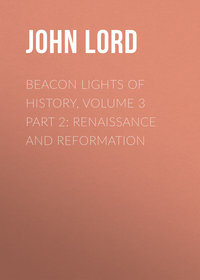Kitabı oku: «Beacon Lights of History, Volume 3 part 2: Renaissance and Reformation», sayfa 18
Bir şeyler ters gitti, lütfen daha sonra tekrar deneyin
Türler ve etiketler
Yaş sınırı:
0+Litres'teki yayın tarihi:
01 aralık 2018Hacim:
370 s. 1 illüstrasyonTelif hakkı:
Public Domain